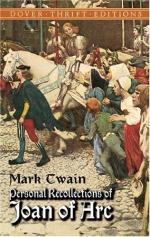Ah, the tedious King and his tedious people! Our two good knights came presently, their patience well wearied, and reported. They and we reverently stood—as becomes persons who are in the presence of kings and the superiors of kings—until Joan, troubled by this mark of homage and respect, and not content with it nor yet used to it, although we had not permitted ourselves to do otherwise since the day she prophesied that wretched traitor’s death and he was straightway drowned, thus confirming many previous signs that she was indeed an ambassador commissioned of God, commanded us to sit; then the Sieur de Metz said to Joan:
“The King has got the letter, but they will not let us have speech with him.”
“Who is it that forbids?”
“None forbids, but there be three or four that are nearest his person—schemers and traitors every one—that put obstructions in the way, and seek all ways, by lies and pretexts, to make delay. Chiefest of these are Georges de la Tremouille and that plotting fox, the Archbishop of Rheims. While they keep the King idle and in bondage to his sports and follies, they are great and their importance grows; whereas if ever he assert himself and rise and strike for crown and country like a man, their reign is done. So they but thrive, they care not if the crown go to destruction and the King with it.”
“You have spoken with others besides these?”
“Not of the Court, no—the Court are the meek slaves of those reptiles, and watch their mouths and their actions, acting as they act, thinking as they think, saying as they say; wherefore they are cold to us, and turn aside and go another way when we appear. But we have spoken with the commissioners from Orleans. They said with heat: ’It is a marvel that any man in such desperate case as is the King can moon around in this torpid way, and see his all go to ruin without lifting a finger to stay the disaster. What a most strange spectacle it is! Here he is, shut up in this wee corner of the realm like a rat in a trap; his royal shelter this huge gloomy tomb of a castle, with wormy rags for upholstery and crippled furniture for use, a very house of desolation; in his treasure forty francs, and not a farthing more, God be witness! no army, nor any shadow of one; and by contrast with his hungry poverty you behold this crownless pauper and his shoals of fools and favorites tricked out in the gaudiest silks and velvets you shall find in any Court in Christendom. And look you, he knows that when our city falls—as fall it surely will except succor come swiftly—France falls; he knows that when that day comes he will be an outlaw and a fugitive, and that behind him the English flag will float unchallenged over every acre of his great heritage; he knows these things, he knows that our faithful city is fighting all solitary and alone against disease, starvation, and the sword to stay this awful calamity, yet he will not strike one blow to save her, he will not hear our prayers, he will not even look upon our faces.’ That is what the commissioners said, and they are in despair.”




